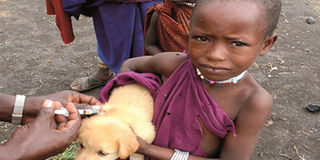Rabies kills 1,500 people each year

A majority of people who die from the highly infectious condition are children from poor and marginal communities, experts say.
What you need to know:
A majority of people who die from the highly infectious condition are children from poor and marginal communities, experts say.
Dar es Salaam. Rabies, a viral infection which mainly results from dog-bites kill around 1,500 people in Tanzania each year, statistics shows.
A majority of people who die from the highly infectious condition are children from poor and marginal communities, experts say.
Despite being an immunisable disease, rabies kills around 160 people every day globally, bringing the total deaths to a staggering 59,000 deaths each year.
Stakeholders working on rabies control say that communities have been waging a war against dogs in response to the menace caused by the domestic animals but their efforts have not yielded any results.
Researchers on rabies said yesterday that hundreds of thousands of dogs are indiscriminately and inhumanely killed every year across the world, yet this makes no difference to the spread of rabies.
Working as part of some International NGOs from the United Kingdom and France, the researchers want to curb the spread of the disease in Tanzania, through carrying out mass vaccination of the dogs and offering mass education to the locals.
During this coming weekend, the NGOs will launch an ambitious project in which they expect to vaccinate at least 70 percent of dogs in some parts of the Arusha region. This project is also being expanded to cover other parts of the world, such as in India, Malawi and Uganda.
Dubbed as Mission Rabies, the project will go along with mass education to the residents of Meru District in the region. Administrative wards, such as Maji ya Chai, Imbaseni and Usa River Wards and Nkoaranga, have been rolled out already for the project.
According to the ‘Mission Rabies’ Director, Dr Kate Shervell, the pilot project will also train veterinary staff and is expected to work in partnership with the Ministry of Livestock and Fisheries to vaccinate around 5000 dogs within two weeks.
“While the education teams will focus their work on teaching children how to behave around dogs and what to do when a dog has bitten them to prevent the spread of the disease, the vaccination teams will be working hard to reach as many owned and stray dogs as possible for vaccination,” said Dr Kate Shervell.




